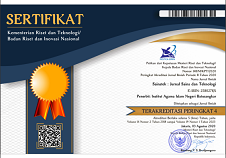Understanding the Theory of Force with Islamic Philosophy
Abstract
Keywords
Full Text:
PDFReferences
Adnan, A. (2017). The Concept of Islamization of Science According to Al Faruqi in the Book Islamization of Science and Its Implications in Indonesia. State Islamic Institute of Surakarta.
Alwi, M. (2017). Islamisasi Ilmu Pengetahuan Kontribusi Dalam Mengatasi Krisis Masyarakat Modern. Inspiratif Pendidikan, 6(2), 259. https://doi.org/10.24252/ip.v6i2.5230
Azizan, B. (2007). Pendekatan holistik agama dan sains: Mekanisme dan enghayatan Penyelesaian Alternatif dalam. Syed Muhammad Dawilah Al-Edrus (pnyt.). Wacana Sejarah dan Falsafah Sains Pendekatan Holistik Sains dan Agama. Dewan Bahasa dan Pustaka.
Chandra, A. N., & Lizelwati, N. (2022). Development of Al-Quran Integrated Physics Practicum Manual in Accordance with the 2013 Curriculum to Develop Practical Skills , Scientific Attitudes , and Religious Attitudes for IT / MA High School Students. 14(1), 32–40.
Eldes, I. (2015). Ilmu dan Hakekat Ilmu Pengetahuan Dalam Nilai Agama. Al-Hikmah, 9(2). https://doi.org/10.24260/al-hikmah.v9i2.322
Fakhri, J. (2010). Sains dan Teknologi Dalam Al-Qur’an dan Implikasinya Dalam Pembelajaran. 01, 22.
Hadi, S., & Ashari, A. (2020). Mendudukkan Kembali Makna Ilmu dan Sains dalam Islam. Tasfiyah, 4(1), 91. https://doi.org/10.21111/tasfiyah.v4i1.3963
Hau, R. R. H., & Nuri. (2019). Pemahaman Siswa terhadap Konsep Hukum I Newton. 2, 56–61.
Idrus, H., Fitrawati, L., & Umar, A. A. (2021). Development of Web-Based Physics E-Module Using Discovery-based Learning Model on Newton’s Law Materials. Sainstek : Jurnal Sains Dan Teknologi, 13(2), 84. https://doi.org/10.31958/js.v13i2.4828
Kadir, A. (2008). Keterkaitan Sains Fisika dengan Al-Qur’an. 1(1). http://dx.doi.org/10.31332/aladl.v1i1.751
Khoiri, A., Agussuryani, Q., & Hartini, P. (2017). Penumbuhan Karakter Islami melalui Pembelajaran Fisika Berbasis Integrasi Sains-Islam. Tadris: Jurnal Keguruan Dan Ilmu Tarbiyah, 2(1), 19. https://doi.org/10.24042/tadris.v2i1.1735
Muiz, A. (2019). Relasi Al-Qur’an Dan Sains (Telaah Kritis Terhadap Tafsir Samudera Alfatihah Karya Bey Arifin).
Priyanto, D. (2014). Modul Perkuliahan Fisika Dasar I Dinamika Partikel. Pusat Bahan Ajar dan eLearning Universitas Mercu Buana. http://www.mercubuana.ac.id
Rashed, Z. N., Tamuri, Ab. H., Pisol, M. I., Ilias, M. F., & Ihwani, S. S. (2016). Peranan al-Quran Sebagai Sumber Ilmu Pengetahuan dan Hubungannya Dengan sains. Conference: Proceeding of 5th International Conference on Islamic Education 2016 (ICIEd 2016), 1. https://www.researchgate.net/publication/312032356_Peranan_Al-Quran_Sebagai_Sumber_Ilmu_Pengetahuan_dan_Hubungannya_dengan_Sains
Wahana, P. (2007). The Role of Science and Human Responsibility (pp. 185–205). Etika Terapan.
DOI: http://dx.doi.org/10.31958/js.v14i2.6953
Refbacks
- There are currently no refbacks.
Copyright (c) 2022 Sylvina Tebriani

This work is licensed under a Creative Commons Attribution-NonCommercial-NoDerivatives 4.0 International License.
Indexed by:
__________________________________________________________________________
Sainstek: Jurnal Sains dan Teknologi
ISSN 2085-8019 (print) | 2580-278x (online)
Published by Institut Agama Islam Negeri Batusangkar
Email: sainstek@iainbatusangkar.ac.id
This work is licensed under a Creative Commons Attribution-NonCommercial-NoDerivatives 4.0 International License.















